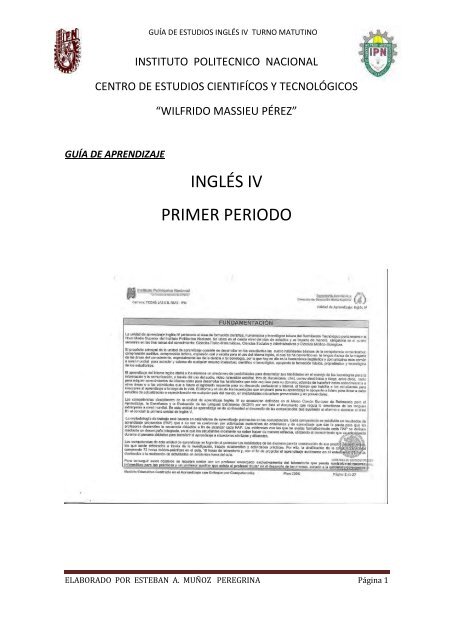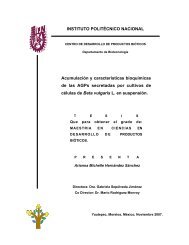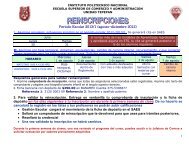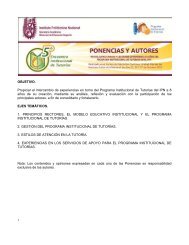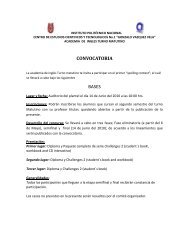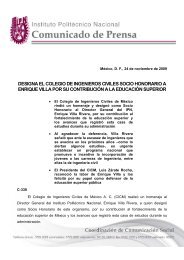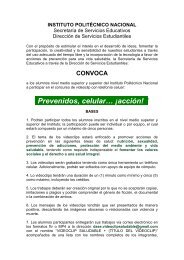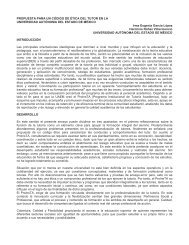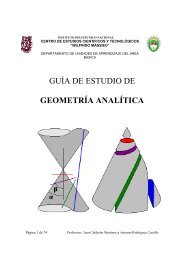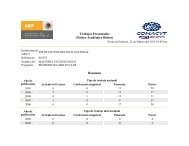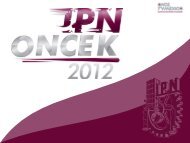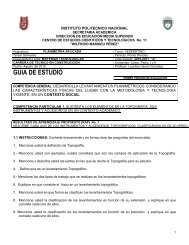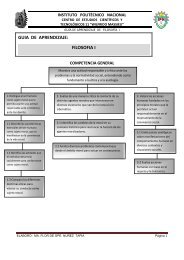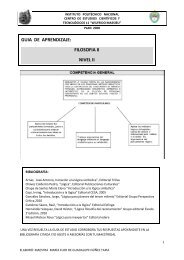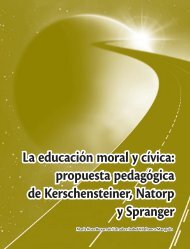INGLÉS IV PRIMER PERIODO - Autoriawcm.ipn.mx
INGLÉS IV PRIMER PERIODO - Autoriawcm.ipn.mx
INGLÉS IV PRIMER PERIODO - Autoriawcm.ipn.mx
You also want an ePaper? Increase the reach of your titles
YUMPU automatically turns print PDFs into web optimized ePapers that Google loves.
GUÍA DE ESTUDIOS <strong>INGLÉS</strong> <strong>IV</strong> TURNO MATUTINO<br />
INSTITUTO POLITECNICO NACIONAL<br />
CENTRO DE ESTUDIOS CIENTIFÍCOS Y TECNOLÓGICOS<br />
GUÍA DE APRENDIZAJE<br />
“WILFRIDO MASSIEU PÉREZ”<br />
<strong>INGLÉS</strong> <strong>IV</strong><br />
<strong>PRIMER</strong> <strong>PERIODO</strong><br />
ELABORADO POR ESTEBAN A. MUÑOZ PEREGRINA Página 1
GUÍA DE ESTUDIOS <strong>INGLÉS</strong> <strong>IV</strong> TURNO MATUTINO<br />
ELABORADO POR ESTEBAN A. MUÑOZ PEREGRINA Página 2
GUÍA DE ESTUDIOS <strong>INGLÉS</strong> <strong>IV</strong> TURNO MATUTINO<br />
ELABORADO POR ESTEBAN A. MUÑOZ PEREGRINA Página 3
GUÍA DE ESTUDIOS <strong>INGLÉS</strong> <strong>IV</strong> TURNO MATUTINO<br />
GUÍA DEL <strong>PRIMER</strong> ORDINARIO DE LA UNIDAD DE APRENDIZAJE <strong>INGLÉS</strong><br />
<strong>IV</strong> TURNO MATUTINO<br />
EVALUACIÓN DE LECTURA DE COMPRENSIÓN<br />
<strong>PRIMER</strong> ORDINARIO<br />
I.-Read the following text.<br />
Dear Suzie,<br />
Hi! I had a great date last night, and I want to tell you about it. I went out with<br />
Fernando. You didn´t meet him when you visited Colombia, but he´s a twenty-oneyear<br />
old university student. I meet him at my twentieth birthday party last month (he<br />
is a friend of Paula`s). He has long, dark hair and brown eyes, and looks terrific!<br />
Well, traditional style for us Colombians, he picked me up exactly on time, at 7.00<br />
p.m. Of course, my parents had asked him to come inside so he could introduce himself!<br />
I think they approved because they smiled at him a lot! After they finished questioning<br />
him (poor thing), we left in his car and…guess what… he even opened the door for me<br />
to get in! And at the restaurant, he moved the chair for me to sit down. What a<br />
gentleman! I like that, although as you know, it´s not common these days.<br />
We had a great meal (the restaurant was La Santa – where we went once,<br />
remember?), and he told me all about his life. He wants to be an architect and live in<br />
Bogotá. The best part was the end –he paid! The, we went to a small bar and talked<br />
for two hours or so. I wanted to stay longer, but I had to be home by twelve. He<br />
walked me to the door and gave a sweet kiss goodnight on the check. Just as well,<br />
because my mother opened the door right at the moment and saw us. I think she was<br />
waiting for me to come home.<br />
Anyway, I know many people think that this “traditional” style of dating is oldfashioned,<br />
but I think it´s more romantic. It was certainly better than other dates I´ve<br />
had, where the men want to go Dutch all the time! I wonder where we´ll go for our<br />
next date…? Fernando is so romantic, I´m sure it will be fantastic!<br />
So, that´s my news. I´ll see him again on the 24 th , that´s next Friday. I can´t wait!<br />
Write and tell me about your love life, too, won´t you? How is Dave… or it is Carl now?<br />
Lot´s of love,<br />
Ana Luisa<br />
ELABORADO POR ESTEBAN A. MUÑOZ PEREGRINA Página 4
GUÍA DE ESTUDIOS <strong>INGLÉS</strong> <strong>IV</strong> TURNO MATUTINO<br />
II- Read these questions and write your answers.<br />
1. - What nationality is Ana Luisa?<br />
_________________________________________________________<br />
2. – How old is she?<br />
________________________________________________________________<br />
3. - Why did her parents invite her date into their home?<br />
________________________________________________________________<br />
4. - What restaurant did she go to with Fernando?<br />
________________________________________________________________<br />
5. - Find two reasons why she thinks Fernando is a “gentleman”?<br />
________________________________________________________________<br />
III.- For each statement, write T (true) or F (false)<br />
6. - _____________ This was Ana Luisa´s first ever date.<br />
7. - _____________ Fernando does not have a full - time job.<br />
8. - _____________Suzie is not from Colombia.<br />
9. - ____________ Ana Luisa thinks Fernando is attractive.<br />
10. - ____________ Ana Luisa prefers more modern men.<br />
<strong>IV</strong>. - What do these numbers refer to?<br />
11. – 21 ________________________________________________________________<br />
12.- 7 ________________________________________________________________<br />
13. – 12 ________________________________________________________________<br />
14. – 2 ________________________________________________________________<br />
15. – 24 ________________________________________________________________<br />
ELABORADO POR ESTEBAN A. MUÑOZ PEREGRINA Página 5
Bibliography:<br />
Title: DEVELOPING READING KEYS .<br />
Author: MILES CRAVEN<br />
Editorial: MACMILLAN<br />
FIRST PUBLISHED 2003<br />
Pages: 32-33<br />
GUÍA DE ESTUDIOS <strong>INGLÉS</strong> <strong>IV</strong> TURNO MATUTINO<br />
V - Read the article and tick () A, B, or C.<br />
I have often thought about moving from my country town to a big city like London. Life<br />
in a country town is quiet and I’ve always found the bright lights and crowded streets<br />
of a city very exciting. However, after a recent visit to London to do some Christmas<br />
shopping and see the Christmas lights, I was very happy to get back home!<br />
There are more people in London than ever before! It was crowded everywhere I<br />
went. The streets, the pavements, the shops, the cafés and the Underground.<br />
Everyone was trying to get somewhere quickly.<br />
I travelled to London by train and the train was so full that I had to stand for the whole<br />
journey. Then I wanted to go on the Underground. That was a big mistake! There were<br />
hundreds of people on the platform and when the train arrived it was full! But the<br />
people on the platform just pushed and pushed and got into the train! I didn’t. I went<br />
back into the street and walked to Oxford Street. It was raining and freezing cold but it<br />
was better than the crowded Underground.<br />
After an expensive coffee I did my shopping. Well, I tried to do my shopping. There<br />
were so many people on the pavements I had to walk in the road and everyone was in<br />
a hurry. They were pushing and knocking each other with their bags. No one talked or<br />
smiled. Then, of course, it was time to go home! My feet were hurting and it was<br />
raining again so I decided not to walk. I got a taxi but it took forty-five minutes because<br />
there was so much traffic. I can’t remember the train journey home. I slept.<br />
Now I know why I live in the country. Life may not be as exciting or as fast as in the<br />
city, but there’s more room on our buses and in our shops, and the people talk to you.<br />
But the Christmas lights in London were beautiful!<br />
Example: The writer went to London to buy some things for Christmas.<br />
A True B False C Doesn’t say<br />
1 The writer lives in the country.<br />
A True B False C Doesn’t say<br />
ELABORADO POR ESTEBAN A. MUÑOZ PEREGRINA Página 6
GUÍA DE ESTUDIOS <strong>INGLÉS</strong> <strong>IV</strong> TURNO MATUTINO<br />
2 The writer lives an hour away from London.<br />
A True B False C Doesn’t say<br />
3 The place she lives in isn’t very quiet.<br />
A True B False C Doesn’t say<br />
4 She went to London a short time ago.<br />
A True B False C Doesn’t say<br />
5 She travelled on an Underground train.<br />
A True B False C Doesn’t say<br />
6 She bought a lot of things.<br />
A True B False C Doesn’t say<br />
7 It was busy in London.<br />
A True B False C Doesn’t say<br />
8 The people in London were very friendly.<br />
A True B False C Doesn’t say<br />
9 Her cup of coffee was cheap.<br />
A True B False C Doesn’t say<br />
10 She liked the Christmas lights.<br />
A True B False C Doesn’t say<br />
Bibliography:<br />
New English file<br />
Clive Oxenden<br />
Christina Latham-Koenig<br />
Paul Seligson<br />
With Lindsay Clandfield<br />
Francesca Target<br />
OXFORD<br />
ELABORADO POR ESTEBAN A. MUÑOZ PEREGRINA Página 7
INSTITUTO POLITECNICO NACIONAL<br />
CENTRO DE ESTUDIOS CIENTÍFICOS Y TECNOLÓGICOS No. 11<br />
“WILFRIDO MASSIEU ”<br />
GUIA DE ESTUDIO PARA EL EXAMEN A TITULO DE SUFICIENCIA<br />
INGLES <strong>IV</strong><br />
JUSTIFICACIÓN: EL APRENDIZAJE DEL IDIOMA INGLES ABRIRA A LOS<br />
ALUMNOS UN SIN NUMERO DE POSIBILIADES PARA<br />
DESARROLLAR SUS HABILIDADES EN EL USO DE LAS<br />
TECNOLOGÍAS PARA LA INFORMACIÓN Y LA<br />
COMUNICACIÓN, A TRAVÈS DEL USO DEL AUDIO,<br />
VIDEO, TELEVISIÓN SATELITAL, FORO DE DISCUSIONES,<br />
CHAT, CORREO ELECTRÓNICO, USO DE BLOGS, ETC.,<br />
TANTO PARA ADQUIRIR CONOCIMIENTOS A OTRAS<br />
AREAS O A LAS ACT<strong>IV</strong>IDADES QUE A FUTURO LE<br />
REQUERIRA, AL EGRESADO, PARA SUDESARROLLO<br />
PROFESIONAL Y LABORAL, AL TIEMPO QUE HABILITA A<br />
LOS ESTUDIANTES A INTEGRARSE AL APRENDIZAJE A<br />
LO LARGO DE LA VIDA, YA QUE LES PERMITE VALERSE<br />
DE LAS TECNOLOGÍAS PARA LA INFORMACIÓN Y LA<br />
COMUNICACIÓN PARA LLEVAR A CABO ESTUDIOS DE<br />
ACTUALIZACION O ESPECIALIZACIÓN EN CUALQUIER<br />
PAIS DEL MUNDO, GRACIAS A LA DIFUSIÓN QUE<br />
ACTUALMENTE TIENE LA EDUCACIÓN A DISTANCIA.<br />
JUNIO 2010<br />
NOMBRE DEL ALUMNO:___________________________________________________<br />
ELABORADA POR: PROFA. ERIKA BERENICE ACOSTA KIRWAN<br />
1
ACADEMIA DE <strong>INGLÉS</strong><br />
TURNO MATUTINO<br />
Con esta guía te apoyaras para estudiar para tu examen a titulo de suficiencia<br />
de Inglés II, donde se vieron los siguientes temas:<br />
PRESENT SIMPLE<br />
PRESENT CONTINUOUS<br />
PRESENT CONTINUOUS VS. PRESENT SIMPLE<br />
PAST SIMPLE (TO BE)<br />
PAST SIMPLE (REGULAR VERBS)<br />
PAST SIMPLE (IRREGULAR VERBS)<br />
PAST SIMPLE VS. PAST CONTINUOUS<br />
QUESTIONS WITH/WITHOUT AUX<br />
SO, BECAUSE, BUT AND ALTHOUGH<br />
VOCABULARY REGULAR AND IRREGULAR VERBS<br />
INSTRUCCIONES GENERALES:<br />
Resuelve la guía en forma individual, usando tu libro de texto “NEW<br />
ENGLISH FILE” PRE-INTERMEDIATE, si tienes alguna duda acude con tu<br />
maestro de Inglés <strong>IV</strong> y aclara tus dudas sobre todo en los temas de<br />
mayor dificultad, contesta con lápiz, puedes utilizar cualquier libro<br />
adicional de gramática y diccionario, antes de resolver la guía estudia<br />
de manera general los temas de tus libros anteriores.<br />
2
Circle the correct answer a, b or c.<br />
1. Danny ………………….to go to the party.<br />
a) want b)wants c)wanting<br />
2. I……………… emails on my computer.<br />
a) run b)write c) talk<br />
3. I really ……….…… Alison. She´s a very good friend.<br />
a) love b)hate c)don´t like<br />
4. Our school lesson …………………at 8:50.<br />
a) start b)starts c)starting<br />
5. David ……………….. your aunt and uncle.<br />
a) know b)knows c)knowing<br />
Complete the text about Alan Martin’s school. Use the<br />
words from the box.<br />
studies uniform Twice always do dining students exams walks start clubs<br />
At Martin’s school, lessons start at 8:50 and finish…….. at 4:00.<br />
Martin 1) ……………..to school but a lot of 2)……………. Go by bus or<br />
car. They al wear 3)………….. every day. There is an hour for lunch,<br />
and Martin 4)……………. Eats a hot meal in the school 5) …………….<br />
Room.<br />
He 6) ……………. Nine subjects this year and his favorite subjects<br />
are IT and Art & Design. 7) …………… a week he stays at school<br />
until 5:00 because he belongs to two school 8…………….<br />
He and his friends 9) ……………. A lot of homework because<br />
they’ve got important 10) ……………… this year.<br />
3
Complete the phone message with the correct form of<br />
present continuous.(affirmative or negative).<br />
Hi, John. This is Patrick. I’m sitting on the bus. We 1) ……………….<br />
(come) in to South London, and it 2) ………………(rain), of course!<br />
The streets are really busy today an we 3) ………………. (move) at<br />
all at the moment. Karen is here somewhere but I can’t see her _<br />
she 4) …………….. (sit) near me. Anyway, I 5) ……………… (phone) to<br />
ask for some help. I know you 6) ……………… (study) at the library<br />
now, but when you finish can you meet us at the bus station?<br />
Mum and Dad 7) ……………… (work) today, so they can’t come and<br />
meet us. Give a ring. Bye.<br />
Match the two parts of the sentences.<br />
1. My friend always work a) for their exams now.<br />
2. She’s helping her mother b)at 6:00 every morning.<br />
3. I enjoy going c) to me.<br />
4. They’re studying d) at the supermarket on<br />
Saturdays.<br />
5. You aren’t listening e) with the cooking.<br />
6. Andrew leaves home f) to the cinema.<br />
Complete the sentences. Use present simple or present<br />
continuous of the verbs.<br />
1. My cousins ……………… usually……………….(not stay) with us<br />
in the summer.<br />
2. Julia hardly ever …………….. (go) to the beach.<br />
4
3. Jane isn’t here at the moment. She ………………… (do) the<br />
shopping.<br />
4. What ………………you …………………(do) after school on<br />
Fridays.<br />
5. Can you help me? I…………….. (not understand) this<br />
question.<br />
Circle the correct answer a, b or c.<br />
1. Marco is ……………. The windows for his grandmother.<br />
a) tidying b)washing up c)cleaning<br />
2. Steve is in Turkey now. …………….. in Istanbul.<br />
a) He stay b)He stays c) He’s staying<br />
3. It ……………. at the moment, but it’s very cold.<br />
a) Snows b) doesn’t snow c) isn’t snowing<br />
4. A: Is Alice doing her homework?<br />
B: No, she ……………<br />
a) isn’t b) doesn’t c) don’t<br />
5. Helena isn’t here, She’s …………. out the new music shop.<br />
a) checks b) checking c) check<br />
Match the questions to the answers.<br />
1. How old are you? a) Peter Jones.<br />
2. What’s your job? b) I’m 28 years old.<br />
3. What’s you name? c) 21, Green Street.<br />
4. What’s your home address? d)8695980.<br />
5. What’s your phone number? e) I’m a waiter.<br />
5
Complete the text with verbs from the box in the past<br />
simple.<br />
move return study continue leave become<br />
star win go divorce die marry be<br />
Ingrid Bergman 1) ________ a famous Swedish actress. She was<br />
born on 29 th August, 1915, in Stockholm.<br />
Ingrid 2) __________ at the Royal Dramatic Theatre in<br />
Stockholm. She 3) _________ to Hollywood in 1939. She 4)<br />
________ famous for her starring role in the classic film<br />
Casablanca. In 1950, she 5) ________ Roberto Rossellini and 6)<br />
________ to Europe. She 7) ______ her acting career there and<br />
8) ______ in French and Italian films. In 1956, she<br />
9) ________ Rossellini and 10) _______ Europe. She 11)<br />
________ to Hollywood and 12) _______ three awards for Best<br />
Actress.<br />
Ingrid Bergman 13) ________ on 29 th August, 1982, in London.<br />
Write complete questions using the past continuous.<br />
1 (what/ Tim/ do/ when you saw him?)<br />
_____________________________________________________<br />
2 (what/ you/ do/ at 11 o’clock?)<br />
_____________________________________________________<br />
3 (what/ she/ wear/ yesterday?)<br />
_____________________________________________________<br />
6
4 (it/ rain/ when you went out?)<br />
_____________________________________________________<br />
5 (where/ you/ live/ in 1981?)<br />
_____________________________________________________<br />
Circle the correct words.<br />
Last Saturday, I went for a walk in the country. It was a sunny day<br />
but/so I took my sunglasses with me. I really enjoyed the walk<br />
but/so I felt dizzy on the way home and/because I fell down. My<br />
sunglasses broke but/and I felt terrible because/and they were<br />
my favorite pair.<br />
Fill in with because or but.<br />
1. Mother cleaned the house yesterday, ……………… she didn’t<br />
wash the clothes.<br />
2. I went to bed early last night……………… I was very tired.<br />
3. I didn’t go to Jenny’s birthday party ………………. I was on<br />
holiday.<br />
4. She went to the dentist…………….. she had a toothache.<br />
5. We didn’t have dinner ……………….. Dad came home.<br />
7
REFERENCIAS BIBLIOGRAFICAS<br />
1) Essential Grammar in Use<br />
Raymond Murphy<br />
Cambridge University Press<br />
Printed in 1990<br />
2) Enterprise 1 (beginner)<br />
Virginia Evans/ Jenny Dooley<br />
Express Publishing<br />
2000 and Workbook<br />
3) Enterprise 2 (elementary(<br />
Virginia Evans/ Jenny Dooley<br />
Express Publishing<br />
1999<br />
4) New English File (elementary)<br />
Clive Oxenden/ Christina Latham-Koening<br />
Oxford<br />
5) New English File (Pre-intermediate)<br />
Clive Oxenden/Christina Latham-Koening<br />
Oxford<br />
6) www.oup/elt/englishfile/elementary<br />
7) www.oup/elt/englishfile/pre-intermediate<br />
8
INSTITUTO POLITÈCNICO NACIONAL<br />
CENTRO DE ESTUDIOS CIENTÍFICOS Y TECNOLÓGICOS “WILFRIDO MASSIEU PÉREZ”<br />
ACADEMIA DE INGLÈS TURNO MATUTINO.<br />
GUIA DE ESTUDIO<br />
INGLÈS <strong>IV</strong><br />
TERCER PERIÒDO ORDINARIO.<br />
MAYO-JUNIO 2010<br />
COMPETENCIA GENERAL DE LA UNIDAD DE APRENDIZAJE INGLÈS <strong>IV</strong>:<br />
Comunica en lengua inglesa experiencias, acontecimientos, aspiraciones,<br />
logros y opiniones, utilizando las estructuras, vocabulario y las<br />
expresiones pertinentes, en forma oral, escrita, en contextos sociales<br />
formales e informales.<br />
COMPETENCIAS GENÈRICAS: Escucha, interpreta y emite mensajes<br />
pertinentes en distintos contextos mediante la utilización de medios,<br />
còdigos y herramientas apropiadas.<br />
Aprende por iniciativa e interès propios a lo largo de la vida.<br />
Participa y colabora de manera efectiva en equipos diversos.<br />
COMPETENCIA PARTICULAR CORRESPONDIENTE AL TERCER<br />
<strong>PERIODO</strong> ORDINARIO: Utiliza el vocabulario y los tiempos presente,<br />
pasado y futuro para comunicar preferencias, experiencias, y<br />
expectativas sobre actividades personales.<br />
NOTAS PARA EL ALUMNO:<br />
En esta guía encontrarás explicaciones y ejercicios que te servirán para<br />
cumplir con las competencias requeridas durante este periodo ordinario,<br />
además deberás:<br />
a) Contestar los ejercicios de la unidad tres de tu “Workbook” o<br />
cuaderno de trabajo.<br />
b) Contestar los ejercicios que se encuentran en tu CD, además de ya<br />
haberlos trabajado con tus profesores en el laboratorio de inglés es<br />
recomendable que los contestes en calma en casa para reforzar tus<br />
habilidades en el idioma.<br />
c) Recurrir a tus profesores para aclarar cualquier duda que tengas<br />
respecto a los contenidos que se te presentan.
FUTURE<br />
Use<br />
1) planned actions in the future<br />
We are going to sing at the party.<br />
1) Going to (idiomatic future).<br />
2) You are certain that sth. is going to happen in the future.<br />
Look at this car! It is going to crash into the yellow one.<br />
Form<br />
Examples<br />
Person + to be (am, are, is) + going to + infinitive<br />
Affirmative sentences:<br />
I am going to play handball.<br />
I'm going to play handball.<br />
Negative sentences:<br />
I am not going to play handball.<br />
I'm not going to play handball.<br />
Questions:<br />
You are going to play handball.<br />
You're going to play handball.<br />
You are not going to play handball.<br />
You're not going to play handball.<br />
You aren't going to play handball.<br />
Am I going to play handball? Are you going to play handball?<br />
ATTENTION!!<br />
Do not mix up with the Present Progressive!<br />
going to-future Present Progressive<br />
He's going to read the book. He's reading the book.
Put in the verbs in brackets into the gaps and form sentences. Use the going to-future.<br />
Example: She _____________ a present for her mother. (to buy)<br />
Answer: She is going to buy a present for her mother. or She's going to buy a present for<br />
her mother.<br />
1) He his friend. (to phone)<br />
2) We<br />
a new computer game. (to play)<br />
3) My sister TV. (to watch)<br />
4) You a picnic next Tuesday. (to have)<br />
5) Jane to the office. (to go)<br />
6) They to the bus stop this afternoon. (to walk)<br />
7) His brother a letter to his uncle today. (to write)<br />
8) She her aunt. (to visit)<br />
9) I my homework after school. (to do)<br />
10) Sophie and Nick her friends. (to meet)<br />
EXERCISE TAKEN FROM INTERNET.<br />
EXERCISE:<br />
Write five plans you have for the weekend:<br />
1. __________________________________________________________<br />
2. __________________________________________________________<br />
3. __________________________________________________________<br />
4.__________________________________________________________<br />
5.__________________________________________________________<br />
EXERCISE:<br />
Complete the ideas using the negative form of going to (person + be<br />
(am/is/are) + not +going to + verb+complement)<br />
Example:<br />
Tom is not going to go to the party because he has an exam.(go to a party)<br />
1. Gio and Cindy _________________________ because they have to<br />
work, (go to the movies)<br />
2. Mary´s father __________________________ because he doesn´t like<br />
to travel. (visit England)
3. The group ____________________________ because they don´t like to<br />
exercise. (participate in a competition)<br />
4. I ______________________________ because I don´t like the forest.<br />
(go camping)<br />
5. My sister and I ______________________ we don´t like coffee. (drink<br />
coffe with friends)<br />
EXERCISE<br />
Answer the next questions about your plans with complete answers.<br />
1. Where are you going to study when you finish your “Vocacional”?<br />
2. How many languages do you want to learn?<br />
3. When are you going to finish this semester?<br />
4. Who are you going to go out with next weekend?<br />
5. Are you going to continue studying at the IPN?<br />
EXERCISE<br />
Write a paragraph about your plans for the rest of the year.<br />
_______________________________________________________________<br />
_______________________________________________________________<br />
_______________________________________________________________<br />
_______________________________________________________________<br />
_______________________________________________________________<br />
_______________________________________________________________<br />
_______________________________________________________________<br />
_______________________________________________________________<br />
_______________________________________________________________<br />
_______________________________________________________________<br />
_______________________________________________________________<br />
_______________________________________________________________<br />
_______________________________________________________________<br />
_______________________________________________________________<br />
_______________________________________________________________<br />
Ask your teacher for help in order to check your written work.
Form of the will-future<br />
2. Will<br />
We form the will-future with the auxiliary will and the infinitive of the verb.<br />
We use the the same form of the verb every time with all subjects.<br />
Affirmative sentences<br />
Example:<br />
He will play football.<br />
NOTE: short/contracted form in the will-future:<br />
He'll play football.<br />
Negative sentences<br />
Example:<br />
He will not play football.<br />
NOTE: short/contracted forms in the will-future:<br />
He won't play football. or<br />
He'll not play football.<br />
Questions<br />
Example:<br />
Will he play football?<br />
Use<br />
1) Future actions happen without the speaker's intention<br />
The sun will shine tomorrow.<br />
2) Predictions, assumptions<br />
I think Sue will arrive in Paris at 6 pm.<br />
3) Spontaneous actions<br />
Hang on! I'll have a word with you.
EXERCISE:<br />
Complete the ideas with the verbs given.<br />
1. 2011 ________________ my last year in this school. (be)<br />
2. Don´t worry mom I________________ the phone! (answer)<br />
3. According to scientists next season it _______________ a lot. (rain)<br />
4. You _______________ the course if you don´t study for the final exams.<br />
(neg/pass)<br />
5. I think my sister ______________ next month. (marry)<br />
6. According to the teachers those students ______________ with honors.<br />
(graduate).<br />
7. He _________ probably _________ medicine, but he hasn´t decided yet.<br />
(study)<br />
EXERCISE:<br />
Answer the questions.<br />
1. Will you live in another country? Why?<br />
2. Where will you live next year? Why?<br />
3. Who will you marry? Why?<br />
4. Will you have a lot of kids? Why?<br />
5. When will you finish your studies? Why?<br />
look<br />
after +<br />
take care of (a child, a<br />
house, a pet)<br />
look for + to seek or<br />
search for<br />
look forward to + anticipate with<br />
pleasure<br />
PHRASAL VERBS<br />
When my sister goes on vacation,<br />
I look after her dog.<br />
I'm looking for my keys. Have<br />
you seen them?<br />
I am looking forward to traveling<br />
to New York next year.
EXERCISE:<br />
Complete the ideas using : look after, look for, and look forward.<br />
1. They are ___________ to going on vacation.<br />
2. Our team needs to ____________ the information in a dictionary.<br />
3. Young people are not ready to __________ a baby.<br />
4. My best friend is ____________ a job.<br />
5. It´s so hard to _____________ sick people, but nurses do it well.<br />
6. I´m _____________ to traveling to Spain.<br />
call someone<br />
back<br />
return a phone<br />
call<br />
I called the company back but the offices were<br />
closed for the weekend.<br />
Come back return The team came back yesterday.<br />
give something<br />
back<br />
pay someone<br />
back<br />
take something<br />
back<br />
return a<br />
borrowed item<br />
return owed<br />
money<br />
I have to give these skates back to Franz before<br />
his hockey game.<br />
Thanks for buying my ticket. I'll pay you back<br />
on Friday.<br />
return an item I have to take our new TV back because it<br />
doesn't work.<br />
EXERCISE:<br />
Complete the ideas using the phrasal verbs from the box.<br />
1. Frederic promised to ___________________ and I´m still waiting.<br />
2. The students ____________ the books __________ to the bookstore,<br />
they were incomplete.<br />
3. I´ll travel to Sonora, but don´t worry, I´ll ________________ on time for<br />
your graduation.<br />
4. Could you lend me $100 pesos and I´ll ____________ next payday?<br />
5. I lent my favorite book to a partner and he never __________ it<br />
____________ .
NOTA PARA LOS ESTUDIANTES: Recuerda que serás evaluado en de<br />
acuerdo a las competencias que debiste haber desarrollado y a las habilidades<br />
que debiste haber adquirido es recomendable que realices nuevamente las<br />
lecturas correspondientes a las unidades 1, 2 y 3 de tu libro, con sus<br />
respectivos ejercicios.<br />
Alexander Graham Bell<br />
Born Mar 3 1847 - Died Aug 2 1922<br />
Telephone / Telegraphy<br />
Telephone / Telegraphy<br />
Patent Number(s) 174,465<br />
Inducted 1974<br />
Alexander Graham Bell's invention of the telephone grew out of his<br />
research into ways to improve the telegraph. On April 6, 1875, Bell<br />
was granted the patent for the multiple telegraph, which sent two<br />
signals at the same time. In September 1875 he began to write the<br />
specifications for the telephone. On March 7, 1876, the U.S. Patent<br />
Office granted him Patent Number 174,465 covering, the method of,<br />
and apparatus for, transmitting vocal or other sounds telegraphically<br />
by causing electrical undulations, similar in form to the vibrations of<br />
the air accompanying the said vocal or other sounds.<br />
Invention Impact<br />
The range of Bell's inventive genius is represented only in part by the<br />
18 patents granted in his name alone and the 12 he shared with his<br />
collaborators. These included 14 for the telephone and telegraph, four<br />
for the photophone, one for the phonograph, five for aerial vehicles,<br />
four for hydroairplanes, and two for a selenium cell.<br />
Inventor Bio<br />
Born in Edinburgh, Scotland, the inventor spent one year at a private<br />
school, two years at Edinburgh's Royal High School (from which he<br />
graduated at 14), and attended a few lectures at Edinburgh University<br />
and at University College in London, but he was largely family-trained<br />
and self-taught. Never adept with his hands, Bell had the good<br />
fortune to discover and inspire Thomas Watson, a young repair<br />
mechanic and model maker, who assisted him enthusiastically in<br />
devising an apparatus for transmitting sound by electricity. After<br />
inventing the telephone, Bell continued his experiments in<br />
communication, which culminated in the invention of the photophonetransmission<br />
of sound on a beam of light- a precursor of today's<br />
optical fiber systems. He also worked in medical research and<br />
invented techniques for teaching speech to the deaf. In 1888 he<br />
founded the National Geographic Society.<br />
TEXT TAKEN FROM INTERNET.
INSTRUCTIONS: Read the text and answer the next questions. (Try to give<br />
complete sentences in your answers)<br />
1. When was Graham Bell born?<br />
__________________________________<br />
2.How many signals did the multiple telegraph sent at the same<br />
time?_________________________________<br />
3. What did he do in September 1875?<br />
_________________________________________<br />
4. How many patents were granted in his name alone and how many with<br />
his collaborators?<br />
___________________________________________________<br />
5. Where did Alexander born?<br />
_____________________________________________________<br />
6. Where did he study the high school?<br />
_____________________________________________________<br />
7. Did Alexander invent the optical fiber systems?<br />
_____________________________________________________<br />
8. What was Alexander´s contribution to medicine?<br />
_____________________________________________________<br />
9. What did he found in 1888?<br />
_____________________________________________________<br />
10. When did Graham Bell die?<br />
_____________________________________________________
EXERCISE:<br />
Answer the next questions about yourself.<br />
1. What major will you study? (use of will)<br />
___________________________________________________<br />
2. How are you going to celebrate when you finish 4 th . Semester? (use of<br />
going to)<br />
_________________________________________________________<br />
3. Mention 5 activities you did on your last vacation. (use of simple past<br />
affirmative )<br />
_________________________________________<br />
_________________________________________<br />
_________________________________________<br />
_________________________________________<br />
_________________________________________<br />
(Check your list of verbs in simple past)<br />
4. Mention 5 activities you wanted to do on your last weekend, but you did´t<br />
do. (use of simple past negative)<br />
__________________________________________________________<br />
__________________________________________________________<br />
__________________________________________________________<br />
__________________________________________________________<br />
__________________________________________________________<br />
5. Do you remember yesterday? What were you doing:<br />
(use of past continuos)<br />
Yesterday at 5:00 am ________________________________________<br />
Yesterday at 7:00 am ________________________________________<br />
Yesderday at 10:00 am _______________________________________<br />
Yesterday at 3:00 pm ________________________________________<br />
Yesterday at 9:00 pm ________________________________________<br />
NOTA: Si tienes dudas en cuanto a los contenidos de esta guía se te sugiere<br />
recurrir a tu profesor.


